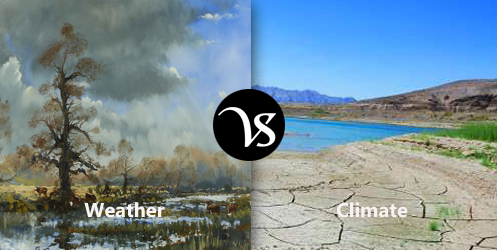 Weather:
Weather:
Weather is the condition of atmosphere which changes day to day. The components which includes are: rain, sunshine, wind, cloudy etc. It is forecasted by meteorologist by considering the temperature and other various factors. It remains for a day or week. Weather is different from place to place. It is dynamic which changes from time to time. The study of weather is called meteorology.
Climate:
Climate is the state of atmosphere which remains for a longer period of time. The study of climate is called climatology. Unlike weather, climate remains for a year or decade. The factors like mountain ranges, large water bodies and attitudes affect the climate. Climate is static which remains constant for a long period of time. It is based on the long term.
Differences:
| Basis | Weather | Climate |
|---|---|---|
| Definition (www.oxforddictionaries.com) |
The state of the atmosphere at a particular place and time as regards heat, cloudiness, dryness, sunshine, wind, rain, etc. | The weather conditions prevailing in an area in general or over a long period. |
| Synonyms | Elements, clime and climate | Temperature, humidity, conditions, latitude and altitude |
| Antonyms | Reject, abdicate, depart, conquer, approve | Peer and cat |
| Punctuations |
|
|
| Types | The types of weather are:
|
Its types are:
|
| Word origin | The word weather was originated before 12th century from Middle English weder. | The word climate was originated in 14th century from Middle English climat. |
| Components | Weather includes sunshine, rain, cloud cover, winds, hail, snow, sleet, freezing rain, flooding, blizzards, ice storms, thunderstorms, steady rains from a cold front or warm front, excessive heat, heat waves and more | Climate may include precipitation, temperature, humidity, sunshine, wind velocity, phenomena such as fog, frost, and hail storms over a long period of time. |
| Determining factors | Real-time measurements of atmospheric pressure, temperature, wind speed and direction, humidity, precipitation, cloud cover, and other variables | Aggregating weather statistics over periods of 30 years (“climate normals”). |
| About | Weather is the day-to-day state of the atmosphere, and its short-term (minutes to weeks) variation | Climate is defined as statistical weather information that describes the variation of weather at a given place for a specified interval. |
| Reflects | Weather reflects short term conditions. | Climate reflects long term conditions. |
| Study | Its study is known as meteorology. | Its study is known as climatology. |
| Forecast | It can be forecasted by collecting meteorological data like air temperature, pressure, humidity, solar radiation, wind speeds and direction, etc. | It can be forecasted by aggregates or weather statistics over periods of 30 years. |
| Example in Sentence |
|
|





